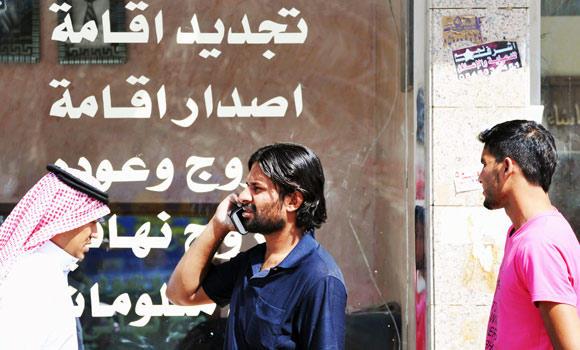
The move includes restricting expats' period of stay in the Kingdom to a maximum of eight years and discouraging them from bringing their families. An expat worker living in the Kingdom with his wife and two children will be considered as two foreign workers under the proposed system.
An expat worker living with his wife will accumulate 1.5 points and will incur a quarter of a point per child.
An expat receiving a salary of SR6,000 and more will be equivalent to 1.5 points in the new system, but professionals whose degrees have been attested by Saudi authorities will be exempted from the salary rule.
Many Saudis and expats have opposed the proposals, saying they would discourage foreign professionals from working in the Kingdom and leave a negative impact on businesses.
“The ministry has floated these proposals for discussion on its website. The move to discourage foreigners to bring their families is not a good idea,” said Ibrahim Badawood, managing director of ALJ Community Initiatives.
Badawood said that the ministry's plan to consider payment of an SR8,000 monthly salary to a Saudi worker as equal to employing two Saudis could be applied after taking into consideration the worker's performance and productivity.
“Paying a high salary to a well-trained and hard-working Saudi will be a wise decision to keep him in the company and win his loyalty,” he told Arab News.
Rafeek Younus, vice president and managing director of Saihati Group, said the ministry should avoid decisions that would send a wrong message to businesses and investors.
“The new labor regulations have already affected the profitability of businesses,” he said. He said the new rules and proposals would discourage Saudis from opening small and medium-sized enterprises.
A draft law published on the ministry's portal, “Together,” said a Saudi worker who earns SR4,000 will account for a full national employee, while those who receive SR2,000 will be treated as half a national employee in the Nitaqat system. A Saudi who receives SR8,000 or more will be counted as two national workers in the system.
Explaining the proposal that restricts the stay of foreign workers, the ministry said an expat who completed four years in the lunar calendar will count for 1.5 points in the Nitaqat system and that this will be calculated from the fifth year after receiving the work permit issued by the ministry.
Those who have completed five years will earn two points, while those working for six years will earn two-and-a-half points and those who have completed seven years will earn three points at the start of eighth year after receiving their work permits. According to Article Four of the new law, three points are the maximum a foreign worker can earn. The law will not apply to nationals who cannot be deported from the country, like Palestinians.
The new law was proposed in the wake of a study that showed unskilled workers staying more years (an average of 7.7 years) than other workers, while expats generally spend an average of 6.9 years.
In a related development, the ministry said it is studying prospects of including part-time Saudi employees and summer-time student trainees in private firms within the Nitaqat system, adding that it would boost the nationalization of jobs.






Comments
Add new comment